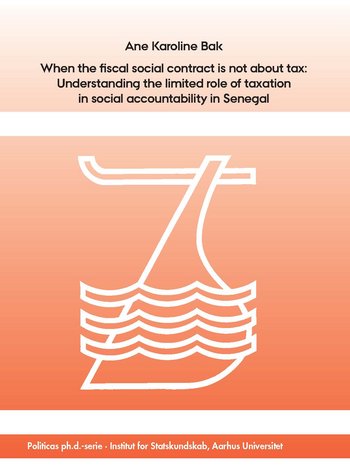Ane Karoline Bak
When the fiscal social contract is not about tax: Understanding the limited role of taxation in social accountability in Senegal

For decades, taxation has featured centrally on the international development agenda. In the 1990s, tax reforms to modernise tax systems were implemented under the auspices of international financial institutions. In the 2000s, taxation became linked to good governance, and in 2015, the Addis Action Agenda made taxation an integral part of the effort to reach the Sustainable Development Goals by 2030. Based on European state-building narratives, taxation is expected to enhance societies’ political engagement around the use of tax revenues and to make states more accountable, leading to a fiscal contract. The dissertation studies this expectation in the case of Senegal. It asks whether, how and under what conditions taxation features in state-society accountability relations in Senegal, focussing specifically on the argument applied by societal actors demanding accountability from the state. With an interpretive approach and based on extensive fieldwork, interview data and a survey with informal, economic actors in Dakar, the dissertation finds that taxation only features to a limited extent. Where taxation does feature, its meaning is shaped by prominent institutional features of state-society accountability relations in Senegal such as network-based and electoral accountabilities. Theoretically, these findings provide important nuances to the fiscal contract theory that lead to a reconceptualisation of the fiscal contract into two distinct concepts. Above all, the dissertation highlights the imperative of taking into consideration the contextual conditions that shape state-society accountability relations, the meaning of taxation and, hence, the potential and actual role of taxation in prompting more accountable governance.
![]() Ophavsretten tilhører Politica. Materialet må ikke bruges eller distribueres i kommercielt øjemed.
Ophavsretten tilhører Politica. Materialet må ikke bruges eller distribueres i kommercielt øjemed.